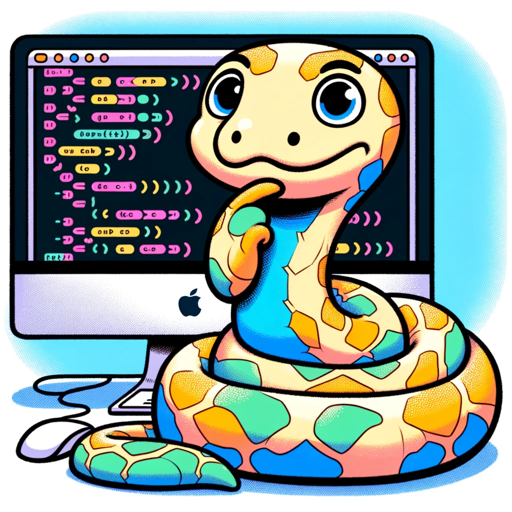Software Engineer-AI-powered code assistant for developers
AI-powered solutions for coding and development.
How do I implement a feature in Python?
What's the best database design for this scenario?
Can you help me understand Git branches?
Tips for improving coding efficiency?
Related Tools
Load More
Software Engineer
Expert Software Engineer in Java, AWS, JavaScript, Python, React. Offers quality code and problem-solving strategies.

World Class Software Engineer
[Start your code projects here.] Elevate your codebase, streamline coding, and seamlessly integrate with GitHub and deploy a live site. This includes creating and maintaining repositories. Features advanced Commands, Website Templates, and a guide to Soft

Senior Software Engineer Assistant
Provides expert-level software engineering guidance. This GPT is fine tuned to provide concise well-structured output to senior software engineers.

Software Engineer
Expert in JavaScript, TypeScript, Node.js, PHP, Python, AWS, & Nest JS. Offers multilingual coding advice in English, Russian, Ukrainian.

Ace The Engineer
Expert in software engineering and data science, providing precise code and technical solutions.

Minimal Software Engineer Advisor
Helps software engineers with all kinds of software/tech questions in a minimal way
20.0 / 5 (200 votes)
Introduction to Software Engineer
Software Engineer is designed to assist users in various aspects of software development, focusing on providing practical and in-depth guidance in coding, database management, version control, and software engineering best practices. The system aims to serve both novice and experienced developers by offering insights into different programming languages, debugging techniques, and optimal ways of structuring code. For instance, if a user is struggling to understand a particular Python function, Software Engineer can explain the concept in detail, provide examples, and even help troubleshoot errors. Additionally, the system can recommend software design patterns, explain concepts like object-oriented programming, and offer advice on scaling applications efficiently. In real-world scenarios, this can translate into helping teams resolve coding bottlenecks, optimize algorithms, or suggest best practices in implementing agile methodologies.

Key Functions of Software Engineer
Code Debugging and Troubleshooting
Example
A user might be developing a Python application that keeps returning an unexpected error. By providing the error code and a snippet of the code, Software Engineer can identify the problem and suggest fixes.
Scenario
For example, a user writes a recursive function to calculate factorial but encounters a maximum recursion depth error. Software Engineer can explain the error, suggest iterative solutions, or advise on how to adjust recursion limits in Python.
Best Practices and Design Patterns
Example
A team of developers is working on a large-scale web application and seeks advice on whether to use the Singleton pattern or Dependency Injection to manage object creation.
Scenario
Software Engineer could provide a detailed breakdown of each design pattern, offer real-world examples of their usage, and explain which pattern might be more efficient based on the project’s architecture.
Database Schema Design and Optimization
Example
A user is setting up a relational database for a new e-commerce platform and needs advice on how to design tables and relationships for products, users, and orders.
Scenario
Software Engineer can guide the user through normalization techniques, suggest indexing strategies for large datasets, and provide SQL query optimization tips to ensure the database runs efficiently even as the platform scales.
Ideal Users of Software Engineer
Software Developers and Engineers
This group includes professionals who are actively involved in writing, testing, and maintaining code. They benefit from using Software Engineer to get expert advice on optimizing their code, resolving bugs, or adopting best practices in software architecture. The platform helps them save time by providing quick, actionable solutions to complex problems.
Students and Aspiring Developers
Software Engineer is ideal for students and beginners who are learning to code or studying computer science. The system provides educational content, explains complex concepts in simple terms, and offers hands-on examples. It’s particularly useful for helping learners navigate programming exercises, understand fundamental algorithms, or get introduced to version control systems like Git.

How to Use Software Engineer
Step 1: Visit aichatonline.org for a free trial without login or need for ChatGPT Plus.
Navigate to the website and immediately start using the tool without needing any subscription or login credentials. The free trial provides full access to explore the platform's features.
Step 2: Define your use case or problem statement.
Think about the specific problem you're facing, whether it's debugging, database management, or code optimization. Having a clear problem in mind helps the tool provide precise assistance.
Step 3: Input code or query in detail.
Provide the tool with detailed inputs such as snippets of your code, technical queries, or high-level software architecture questions. The more context provided, the more accurate and useful the response.
Step 4: Explore suggested solutions or steps.
Review the answers or solutions offered by the tool. It may suggest code optimizations, database schemas, or project structuring tips. Be sure to assess if the recommendations fit your project requirements.
Step 5: Iterate based on feedback and refine your code.
Use the tool’s feedback to improve your code or design. You can also follow up with further queries, progressively fine-tuning your solution or design as per the suggestions.
Try other advanced and practical GPTs
API Finder
AI-powered API search and discovery tool.
SEO
AI-Powered SEO for Better Rankings

Physical Education GPT
AI-driven Physical Education expertise for teachers.

Consistency Crafter 2024
AI-powered consistent character illustrations

Python Code Companion
Your AI-powered Python coding assistant

Tattoo Design & Stencil
AI-Powered Tattoo Design & Stencil Tool

LearnMate
AI-powered learning tailored to you

Meme Master Daily
AI-powered meme creation at its best

PODpreneur Advisor - Print on Demand Tool
AI-Powered Insights for Print on Demand

PentestGPT
AI-Powered Penetration Testing Simplified

Paper Decoder
AI-Powered Tool for Decoding Research Papers

BostonGPT
BostonGPT: Your Boston AI Buddy.

- Optimization
- Debugging
- Code Review
- Database Design
- Version Control
Common Q&A About Software Engineer
What kind of programming tasks can Software Engineer help with?
Software Engineer can assist with a wide range of tasks, from debugging code in languages like Python, Java, and C++ to offering guidance on database design, version control (Git), and best practices in software development. It can also help optimize code, refactor scripts, or suggest architectural improvements.
Can Software Engineer assist with database-related questions?
Yes, it can provide help with both SQL and NoSQL databases. Whether you're designing schemas, querying data, or optimizing database performance, Software Engineer can suggest best practices and even troubleshoot queries.
Does Software Engineer support version control systems like Git?
Yes, Software Engineer can assist with Git commands, branching strategies, merging, and conflict resolution. It helps guide users through the version control process, ensuring smooth code management and collaboration.
How can Software Engineer improve my code quality?
By offering code reviews, optimization tips, and suggesting design patterns or best practices, Software Engineer ensures your code follows industry standards. It identifies inefficiencies, redundant code, and potential bugs, providing actionable feedback for improvement.
What are the best use cases for Software Engineer?
The tool is excellent for software development tasks, including debugging, database management, code optimization, architectural design, and version control. It can also be used for learning and practicing coding skills in different languages and frameworks.